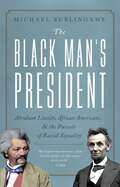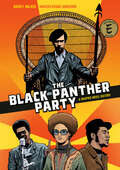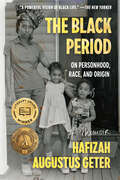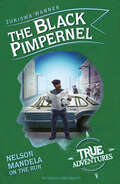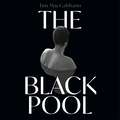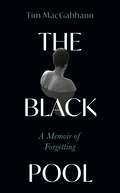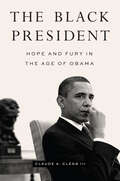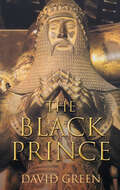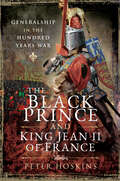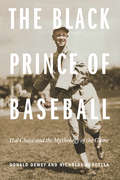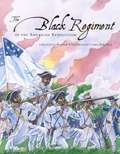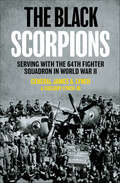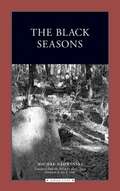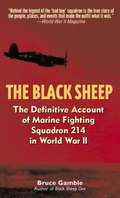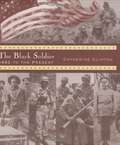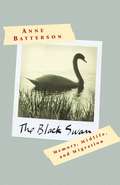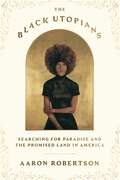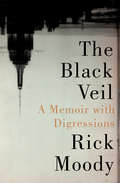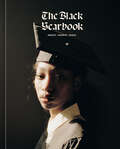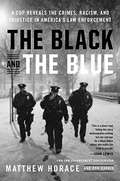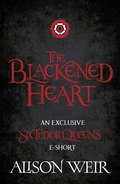- Table View
- List View
The Black Man's President: Abraham Lincoln, African Americans, and the Pursuit of Racial Equality
by Michael BurlingameFrederick Douglass called the martyred president "emphatically the black man's president&” as well as &“the first who rose above the prejudice of his times and country.&” This narrative history of Lincoln&’s personal interchange with Black people over the course his career reveals a side of the sixteenth president that, until now, has not been fully explored or understood.In a little-noted eulogy delivered shortly after Lincoln's assassination, Frederick Douglass called the martyred president "emphatically the black man's president," the "first to show any respect for their rights as men.&” To justify that description, Douglass pointed not just to Lincoln's official acts and utterances, like the Emancipation Proclamation or the Second Inaugural Address, but also to the president&’s own personal experiences with Black people. Referring to one of his White House visits, Douglass said: "In daring to invite a Negro to an audience at the White House, Mr. Lincoln was saying to the country: I am President of the black people as well as the white, and I mean to respect their rights and feelings as men and as citizens.&” But Lincoln&’s description as &“emphatically the black man&’s president&” rests on more than his relationship with Douglass or on his official words and deeds. Lincoln interacted with many other African Americans during his presidency His unfailing cordiality to them, his willingness to meet with them in the White House, to honor their requests, to invite them to consult on public policy, to treat them with respect whether they were kitchen servants or leaders of the Black community, to invite them to attend receptions, to sing and pray with them in their neighborhoods—all those manifestations of an egalitarian spirit fully justified the tributes paid to him by Frederick Douglass and other African Americans like Sojourner Truth, who said: "I never was treated by any one with more kindness and cordiality than were shown to me by that great and good man, Abraham Lincoln.&” Historian David S. Reynolds observed recently that only by examining Lincoln&’s &“personal interchange with Black people do we see the complete falsity of the charges of innate racism that some have leveled against him over the years.&”
The Black Panther Party: A Graphic Novel History
by David F. WalkerWINNER OF THE EISNER AWARD • A bold and fascinating graphic novel history of the revolutionary Black Panther Party.Founded in Oakland, California, in 1966, the Black Panther Party for Self-Defense was a radical political organization that stood in defiant contrast to the mainstream civil rights movement. This gripping illustrated history explores the impact and significance of the Panthers, from their social, educational, and healthcare programs that were designed to uplift the Black community to their battle against police brutality through citizen patrols and frequent clashes with the FBI, which targeted the Party from its outset. Using dramatic comic book-style retellings and illustrated profiles of key figures, The Black Panther Party captures the major events, people, and actions of the party, as well as their cultural and political influence and enduring legacy.
The Black Penguin
by Andrew EvansA devout young boy in rural Ohio, Andrew Evans had his life mapped for him: baptism, mission, Brigham Young University, temple marriage, and children of his own. But as an awkward gay kid, bullied and bored, he escaped into the glossy pages of National Geographic and the wide promise of the world atlas. The Black Penguin is Evans's memoir, travel tale, and love story of his eventual journey to the farthest reaches of the map, a wild yet touching adventure across some of the most astonishing landscapes on Earth. <P><P> Ejected from church and shunned by his family as a young man, Evans embarks on an ambitious overland journey halfway across the world. Riding public transportation, he crosses swamps, deserts, mountains, and jungles, slowly approaching his lifelong dream and ultimate goal: Antarctica. With each new mile comes laughter, pain, unexpected friendship, true weirdness, unsettling realities, and some hair-raising moments that eventually lead to a singular discovery on a remote beach at the bottom of the world. <P><P> Evans's 12,000-mile voyage becomes a soulful quest to balance faith, family, and self, reminding us that, in the end, our lives are defined by the roads we take, the places we touch, and those we hold nearest.
The Black Period: On Personhood, Race, and Origin
by Hafizah Augustus GeterAn acclaimed poet reclaims her origin story as the queer daughter of a Muslim Nigerian immigrant and a Black American visual artist in this groundbreaking memoir, combining lyrical prose, biting criticism, and haunting visuals.&“Hafizah Augustus Geter is a genuine artist, not bound by genre or form. Her only loyalty is the harrowing beauty of the truth.&”—Tayari Jones, author of An American Marriage&“I say, &‘the Black Period,&’ and mean &‘home&’ in all its shapeshifting ways.&” In The Black Period, Hafizah creates a space for the beauty of Blackness, Islam, disability, and queerness to flourish, celebrating the many layers of her existence that America has time and again sought to erase. At nineteen, she lost her mother to a sudden stroke. Weeks later, her father became so heartsick that he needed a triple bypass. By her thirties, she was constantly in pain, pinballing between physical therapy appointments, her grief, and the grind that is the American Dream. Hafizah realized she'd spent years internalizing the narratives that white supremacy had fed her about herself. Suddenly, she says, I was standing at the cliff of my own life, remembering.Recalling her parents&’ lessons on the art of Black revision, and mixing history, political analysis, and cultural criticism, alongside stunning original artwork created by her father, renowned artist Tyrone Geter, Hafizah maps out her own narrative, weaving between a childhood populated with Southern and Nigerian relatives; her days in a small Catholic school; a loving but tragically short relationship with her mother; and the feelings of joy and community that the Black Lives Matter protests engendered in her as an adult. All throughout, she forms a new personal and collective history, addressing the systems of inequity that make life difficult for non-able-bodied persons, queer people, and communities of color while capturing a world brimming with potential, art, music, hope, and love.A unique combination of gripping memoir and Afrofuturist thought, in The Black Period, Hafizah manages to sidestep shame, confront disability, embrace forgiveness, and emerge from the erasures America imposes to exist proudly and unabashedly as herself.
The Black Pimpernel: Nelson Mandela on the Run (True Adventures)
by Zukiswa WannerThe story of Nelson Mandela's early years on the run from the apartheid authoritiesJOHANNESBURG. MARCH 1961. Thirty-one activists are on trial for treason. Among their number is Nelson Mandela, a rising star of the resistance movement and one of the biggest threats to the South African government and their racist system of apartheid. To everyone's surprise, they are found not guilty. But rather than relish his newfound freedom, Nelson disappears. With this, the incredible true story of Nelson Mandela's life on the run begins. For months, he is an outlaw, the police and secret services hunting him in vain, living under new identities and separated from his young family. His mission? To set up armed resistance to apartheid, and in doing so change the course of history.
The Black Pool: A Memoir of Forgetting
by Tim MacGabhann'An unforgettable, freewheeling masterclass'MICHAEL MAGEE, Nero Book Award-winning author of Close to Home'Funny, nerve-wracking and utterly compelling'COLIN BARRETT, Booker Prize-longlisted author of Wild Houses'Extraordinary... A writer with a rare gift. I feel changed by it'BELINDA MCKEON, author of Solace'I was floored by the power and beauty of this book'DONAL RYAN, author of The Queen of Dirt IslandPrepare to look into The Black Pool and see a little part of yourself reflected back'JAN CARSON, EU Prize for Literature-winning author of The Raptures'Simultaneously tender, raw, profound, hilarious and horrible, guiding us through a nightmare into beautiful, hard-won wisdom'LISA MCINERNEY, Women's Prize for Fiction-winning author of The Glorious HeresiesFollowing an obsessive mind trying (and failing) to find relief, The Black Pool is a gripping thrill-ride through violent, chaotic underworlds. Tracing the roots of an illness through the failures of youth and adolescence and finally back to childhood, it's about all the wrong places where addicts look for transcendence - from work, to relationships, to writing, to anger.The Black Pool shows what happens when everything falls apart. It shows us rock bottom and the start of the journey to the surface from there. It's a memoir shot full of holes and shocking clarities. Towards the end, it achieves something like serenity - something like recovery.
The Black Pool: A Memoir of Forgetting
by Tim MacGabhann'An unforgettable, freewheeling masterclass'Michael Magee, Nero Book Award-winning author of Close to Home 'Funny, nerve-wracking and utterly compelling'Colin Barrett, Booker Prize-longlisted author of Wild Houses'Extraordinary... A writer with a rare gift. I feel changed by it'Belinda McKeon, author of Solace'I was floored by the power and beauty of this book'Donal Ryan, author of The Queen of Dirt Island'Tim MacGabhann writes with piercing honesty, humour and tenderness... Prepare to look into The Black Pool and see a little part of yourself reflected back'Jan Carson, EU Prize for Literature-winning author of The Raptures'A reading experience of the highest order'Wendy Erskine, author of Dance Move'Extraordinary' Lisa McInerney, Women's Prize for Fiction-winning author of The Glorious HeresiesA raw and powerful memoir of addiction and recovery, across three continents and multiple drugs, from early childhood through adulthood.Following an obsessive mind trying (and failing) to find relief, The Black Pool is a gripping thrill-ride through violent, chaotic underworlds. Tracing the roots of an illness through the failures of youth and adolescence and finally back to childhood, it's about all the wrong places where addicts look for transcendence - from work, to relationships, to writing, to anger.It shows what happens when everything falls apart. It shows us rock bottom and the start of the journey to recovery from there. It's a memoir shot full of holes and shocking clarities. And towards the end, it achieves something like serenity - something like recovery.'Raw and powerful' Irish Times, Books to look out for in 2025'A vibrant, darkly humorous writer' Irish Independent, Non-fiction highlights for 2025'A gripping and personal story of addiction' Irish Examiner, 2025 Books to Read'Unflinchingly honest, heart-wrenching and life-affirming' RTÉ, 10 books we're looking forward to reading in 2025
The Black President: Hope and Fury in the Age of Obama
by Claude A. Clegg IIIThe first sweeping, legacy-defining history of the entire Obama presidency.In The Black President, the first interpretative, grand-narrative history of Barack Obama's presidency in its entirety, Claude A. Clegg III situates the former president in his dynamic, inspirational, yet contentious political context. He captures the America that made Obama's White House years possible, while insightfully rendering the America that resolutely resisted the idea of a Black chief executive, thus making conceivable the ascent of the most unlikely of his successors. In elucidating the Obama moment in American politics and culture, this book is also, at its core, a sweeping exploration of the Obama presidency's historical environment, impact, and meaning for African Americans—the tens of millions of people from every walk of life who collectively were his staunchest group of supporters and who most starkly experienced both the euphoric triumphs and dispiriting shortcomings of his years in office. In Obama's own words, his White House years were "the best of times and worst of times" for Black America. Clegg is vitally concerned with the veracity of this claim, along with how Obama engaged the aspirations, struggles, and disappointments of his most loyal constituency and how representative segments of Black America engaged, experienced, and interpreted his historic presidency. Clegg draws on an expansive archive of materials, including government records and reports, interviews, speeches, memoirs, and insider accounts, in order to examine Obama's complicated upbringing and early political ambitions, his delicate navigation of matters of race, the nature and impacts of his administration's policies and politics, the inspired but also carefully choreographed symbolism of his presidency (and Michelle Obama's role), and the spectrum of allies and enemies that he made along the way. The successes and the aspirations of the Obama era, Clegg argues, are explicitly connected to our current racist, toxic political discourse. Combining lively prose with a balanced, nonpartisan portrait of Obama's successes and failures, The Black President will be required reading not only for historians, politics junkies, and Obama fans but also for anyone seeking to understand America's contemporary struggles with inequality, prejudice, and fear.
The Black Prince
by David GreenOne of the most charismatic and enigmatic personalities of the High Middle Ages, Edward the 'Black Prince' commanded an English division at the battle of Crecy at just 16 years old. But despite his battlefield exploits, romantic reputation, and popularity among the people, Edward has become notorious as a proponent of 'scorched earth' campaigns, or chevauchee. These expeditions amounted to little more than the licensed plunder of undefended towns and the murder of non-combatants. The premature death of Edward saw his infant son ascend to the throne and led, eventually, to the fraticidal chaos of the Wars of the Roses and the emergence of the Tudor dynasty. In this startling reappraisal of the prince's life, David Green assesses his actions in their historical context and examines what might have been had Edward the Black Prince become King Edward IV.
The Black Prince and King Jean II of France: Generalship in the Hundred Years War
by Peter HoskinsThis study of Medieval military leadership offers a critical comparison of two great rivals of the Hundred Year War.Known to history as The Black Prince, Edward of Woodstock led the English army to victory at the Battle of Poitiers against the French King Jean II. With an illuminating analysis of these fourteenth century commanders, historian Peter Hoskins examines the importance of leadership, strategic vision, and tactical skill in medieval warfare. Paying close attention to their strengths and weaknesses as soldiers, both on campaign and on the battlefield, Hoskins also considers their contrasting characters and backgrounds as well as the military traditions of their time.The Black Prince was one of the most admired generals of his generation: a charismatic leader, decisive commander, and shrewd tactician and strategist. In contrast King Jean was impulsive, driven more by pride than by strategic priorities. When he was put to the ultimate test at Poitiers, Jean lost control of his army. Meanwhile, the Black Prince took the initiative personally to secure victory against the odds.Peter Hoskins analyses the leadership qualities of the prince and the king according to the principles of war enunciated by Sun Tzu and Vegetius as well as the modern principles of war of the United Kingdom armed forces. He gives readers a fascinating insight into the nature of command and the conduct of war in the Middle Ages.
The Black Prince and the Sea Devils: The Story of Prince Valerio Borghese and the Elite Commandos of the Decima
by Jack Greene Alessandro MassignaniThe only biography of Prince Valerio Borghese-the legendary Italian World War II naval commando whose covert activities shocked the Allies and became a model for today's special forces
The Black Prince of Baseball: Hal Chase and the Mythology of the Game
by Donald Dewey Nicholas AcocellaAs America lurched into the twentieth century, its national pastime was afflicted with the same moral malaise that was enveloping the rest of the nation. Players regularly bet on games, games were routinely fixed, and league politics were as dirty as the base paths. Against this backdrop, Hal Chase emerged as one of the game’s greatest players and also as one of its most scandalous characters. With charisma and bravado that earned him the nickname The Prince, Chase charmed his way across America, spinning lies in the afternoon, dealing high-stakes poker at night, and gambling with beautiful women until dawn. Most notoriously of all, he undermined his stature as the era’s greatest first baseman by conniving with gamblers to fix games and draw teammates into his diamond conspiracies. But as Donald Dewey and Nicholas Acocella reveal in their groundbreaking biography, The Black Prince of Baseball, Chase was also a scapegoat for baseball notables with hands even dirtier than his. These included league officials who ignored facts in an attempt to pin the 1919 Black Sox scandal on him and—a previously unknown twist—the fabled John McGraw, who perjured himself on a witness stand against the first baseman. Although Chase, contrary to popular belief, was never banned from the major leagues, meticulous research by the authors implicates him in other shady enterprises as well, not least an attempt to blackmail revivalist Aimee Semple McPherson. As The Black Prince of Baseball makes clear, in his protean talents and larcenies, Hal Chase personified all the excesses of Ragtime.
The Black Regiment Of The American Revolution
by Linda Brennan Cheryl NollThe heroism of America's first Black Regiment during the Revolutionary War is well documented by author Linda Crotta Brennan. Artist Cheryl Kirk Noll complements Brennan's text with large, colorful, detailed illustrations.
The Black Scorpions: Serving with the 64th Fighter Squadron in World War II
by James A. Lynch Gregory Lynch Jr."This book richly details life in a fighter squadron. Readers will learn new details and gain a better understanding of the daily experience outside of the intense combat environment. It is well worth reading this contribution to World War II oral history." —The Journal of America's Military PastOn December 6, 1941, despite his objections, James Lynch was discharged from the Army for being over age in grade. After the terrible events at Pearl Harbor, James Lynch was recalled to duty. Within a month he was part of the Air Corps, involved in a secret project to send air support to help General Montgomery and the Eighth Army. He joined the nucleus of officers in charge of the 64th Fighter Squadron, 57th Fighter Group. For the next 33 months, he fought across the top of Africa and then up through Italy. The 57th Fighter Group arrived in Egypt just in time for the battle at El Alamein. How the United States was able to get the pink-winged P-40s to the battlefield baffled the Germans for many years. The Black Scorpions chased the Afrika Corps across the top of Africa, culminating in the Palm Sunday massacre where the Squadron helped shoot down 74 planes in a single engagement. For the Italian campaign, the Black Scorpions switched from P-40s to P-47s, changing from fighters to bombers and disrupting the German and Italian lines up the Italian Peninsula. Through all the battles, including a battle with an erupting Mount Vesuvius, James Lynch kept an unauthorized diary. He also collected daily intelligence reports, newspaper stories, souvenirs, pictures, and letters from home. After the war he reminisced with fellow soldiers about their experiences, and eventually felt it was time to write the story of the Black Scorpions—this book is the result.
The Black Seasons
by Michal GlowinskiA mosaic of memories from a childhood in the Warsaw Ghetto and a life in hiding on the other side of the wall When six-year-old Michal Glowinski first heard the adults around him speak of the ghetto, he understood only that the word was connected with moving-and conjured up a fantastical image of a many-storied carriage pulled through the streets by some umpteen horses. He was soon to learn that the ghetto was something else entirely. A half-century later, Glowinski, now an eminent Polish literary scholar, leads us haltingly into Nazi-occupied Poland. Scrupulously attentive to the distance between a child's experience and an adult's reflection, Glowinski revisits the images and episodes of his childhood: the emaciated violinist playing a Mendelssohn concerto on the ghetto streets; his game of chess with a Polish blackmailer threatening to deliver him to the Gestapo; and his eventual rescue by Catholic nuns in an impoverished, distant convent. In language at once spare and eloquent, Glowinski explores the horror of those years, the fragility of existence, and the fragmented nature of memory itself.
The Black Sheep: The Definitive History of Marine Fighting Squadron 214 in World War II
by Bruce GambleWith their renowned squadron leader Greg "Pappy" Boyington, Marine Fighting Squadron (VMF) 214 was one of the best-known and most colorful combat units of World War II. The popular television series Baa Baa Black Sheep added to their legend--while obscuring the truly remarkable combat record of the Black Sheep and Boyington. A retired naval flight officer and former historian for the Naval Aviation Museum Foundation, Bruce Gamble provides a highly readable account that serves to both correct and extend the record of this premier fighting force.
The Black Soldier: 1492 to the Present
by Catherine ClintonBlack soldiers have fought and died in the Americas for centuries, an unbroken chain of warriors stretching back nearly five hundred years. Yet their contribution to our nation's history has been neglected, and the battles they've had to fight against racism and prejudice have often been as challenging as facing the enemy on the field of battle. In this exciting story of African American heroism, Catherine Clinton traces the history of the black soldier, from the first African explorers who accompanied Columbus to African Americans who took up arms in the American Revolution and the Civil War, to those who served their country from the Montana frontier to the sands of Desert Storm. Their heroic tales show that while black soldiers were once systematically ignored in the armed forces, earning little praise and often dying for a nation that granted them few rights, with each successive opportunity to prove themselves in combat and in the ranks, black men and women have risen to the occasion and distinguished themselves. Ultimately it was the sacrifices of these valiant soldiers that led to today's fully integrated armed services.
The Black Swan
by Anne BattersonSet against a spontaneous cross-country road trip following the migrating birds, this passionate, lyrical memoir is one woman's reflections on midlife, her important personal relationships, her kaleidoscopic past, and her uncertain future. To fifty-six-year-old Anne Batterson, a woman whose life has been filled with adventure -- as a commercial pilot, an international skydiving champion, a trekking guide in Nepal -- her husband's decision to retire felt like a death sentence. Yearning for some way to reconcile herself to the future that was rapidly unfolding before her, she packed up her VW camper and hit the road with maps, bird guides, and little else except the desire to follow the fall migration and the bone-deep hunch that birds had something important to teach her. In this beautifully written narrative of that extraordinary trip, Batterson writes movingly not only about her experiences with the birds but also about the people she loves, has lost, and connects with along the way. Events from the present trigger vivid stories from the past. In the chapter "The Journey Within the Journey," a long, lonely night in a deserted campground in Virginia conjures up the ghosts of a desperate solo road trip she made when she was twenty-one. A towering cumulus cloud in Illinois brings back a breathtaking free fall into a similar cloud in "My Time as a Bird. " An encounter with a great blue heron summons a compelling account of her mother's last afternoon in the world. "Bears in the Woods" describes a run-in with twoDeliverance-type men in West Virginia, which brings back the murder of a dear friend in the woods of Connecticut. By the end of the journey, the ghosts of the past, like the author herself, have become part of a more fluid, more spiritual reality -- wild and spare and elegant and timeless -- one that is always out there, "quickening on the far side of reality. "A unique mix of memoir and nature writing,The Black Swanis a charming story of a woman's odyssey.
The Black Utopians: Searching for Paradise and the Promised Land in America
by Aaron RobertsonA New York Times Editors's Choice | A New Republic Best Book of the Fall"[An] extraordinary new work of history and memoir . . . Unforgettable." —Gabriel Bump, The Washington Post"An extraordinary achievement in narrative nonfiction." —Hamilton Cain, Minneapolis Star-TribuneA lyrical meditation on how Black Americans have envisioned utopia—and sought to transform their lives.How do the disillusioned, the forgotten, and the persecuted not merely hold on to life but expand its possibilities and preserve its beauty? What, in other words, does utopia look like in black?These questions animate Aaron Robertson’s exploration of Black Americans' efforts to remake the conditions of their lives. Writing in the tradition of Saidiya Hartman and Ta-Nehisi Coates, Robertson makes his way from his ancestral hometown of Promise Land, Tennessee, to Detroit—the city where he was born, and where one of the country’s most remarkable Black utopian experiments got its start. Founded by the brilliant preacher Albert Cleage Jr., the Shrine of the Black Madonna combined Afrocentric Christian practice with radical social projects to transform the self-conception of its members. Central to this endeavor was the Shrine’s chancel mural of a Black Virgin and child, the icon of a nationwide liberation movement that would come to be known as Black Christian Nationalism. The Shrine’s members opened bookstores and co-ops, created a self-defense force, and raised their children communally, eventually working to establish the country’s largest Black-owned farm, where attempts to create an earthly paradise for Black people continues today. Alongside the Shrine’s story, Robertson reflects on a diverse array of Black utopian visions, from the Reconstruction era through the countercultural fervor of the 1960s and 1970s and into the present day. By doing so, Robertson showcases the enduring quest of collectives and individuals for a world beyond the constraints of systemic racism. The Black Utopians offers a nuanced portrait of the struggle for spaces—both ideological and physical—where Black dignity, protection, and nourishment are paramount. This book is the story of a movement and of a world still in the making—one that points the way toward radical alternatives for the future.
The Black Veil: A Memoir with Digressions (21 Ser. #35)
by Rick MoodyA raw, unflinching, convention-defying memoir of substance abuse, depression, and guilt In his genre-bending memoir, Rick Moody, author of The Ice Storm, delves into not only his own tormenting struggle with depression and alcoholism but also the pathos inherent in American society. Beginning with his childhood and widening his gaze to his ancestral past, Moody elegantly details the events that led him to admit himself to a psychiatric hospital. Seeking explanations for his inner demons, Moody traces his lineage back to Joseph "Handkerchief" Moody. In early-eighteenth-century Maine, Joseph accidentally killed his childhood friend and wore a handkerchief over his face for the rest of his life as a self-imposed punishment. His story stirs within Moody a drive to understand his own failings through a study of American violence from colonial times to the 1999 massacre at Columbine High School. Remarkably broad in scope and full of Moody's witticisms and brilliantly crafted prose, The Black Veil is an extraordinary exploration of both personal and cultural shame that transcends the expectations of a memoir.
The Black Yearbook [Portraits and Stories]
by Adraint Khadafhi BerealA gripping exploration of the joys, hardships, and truths of Black students through intimate, honest dialogues and stunning photography, with a foreword by Kiese Laymon, author of Heavy&“A radical, reverential, and restorative document of community.&”—Rebecca Bengal, author of Strange Hours: Photography, Memory, and the Lives of ArtistsWhen photographer Adraint Bereal graduated from the University of Texas, he self-published an impressive volume of portraits, personal statements, and interviews that explored UT's campus culture and offered an intimate look at the lives of Black students matriculating within a majority white space. Bereal's work was inspired by his first photo exhibition at the George Washington Carver Museum in Austin, entitled 1.7, that unearthed the experiences of the 925 Black men that made up just 1.7% of UT's total 52,000 student body.Now Bereal expands the scope of his original project and visits colleges nationwide, from Historically Black Colleges and Universities (HBCUs) to predominantly white institutions to trade schools and more. Rather than dwelling on the monolith of trauma often associated with Black narratives, Bereal is dedicated to using honest dialogue to share stories of true joy and triumph amidst the hardships, prejudices, and internal struggles. Using an exciting and eclectic design approach to accompany the portraits and stories, each individual profile effectively conveys the interviewee's unique voice, tone, and background.The Black Yearbook reframes society's stereotypical perception of higher education by representing and celebrating the wide range of Black experiences on campuses.
The Black and the Blue: A Cop Reveals the Crimes, Racism, and Injustice in America's Law Enforcement
by Matthew Horace Ron HarrisCNN contributor offers a searing indictment of America's law enforcement."This is a must-read.... Telling this story demonstrates nothing but raw courage for a black police officer who wants the truth to prevail." --John Lewis"[T]his [is a] hard-hitting, convincing indictment of the biases in today's law enforcement.... A must-read for anyone interested in understanding and solving these problems." --Booklist (starred review)Matthew Horace was an officer at the federal, state, and local level for 28 years working in every state in the country. Yet it was after seven years of service when Horace found himself face-down on the ground with a gun pointed at his head by a white fellow officer, that he fully understood the racism seething within America's police departments. Using gut-wrenching reportage, on-the-ground research, and personal accounts garnered by interviews with police and government officials around the country, Horace presents an insider's examination of police tactics, which he concludes is an "archaic system" built on "toxic brotherhood." Horace dissects some of the nation's most highly publicized police shootings and communities highlighted in the Black Lives Matter movement and beyond to explain how these systems and tactics have had detrimental outcomes to the people they serve. Horace provides fresh analysis on communities experiencing the high killing and imprisonment rates due to racist policing such as Ferguson, New Orleans, Baltimore, and Chicago from a law enforcement point of view and uncovers what has sown the seeds of violence.Timely and provocative, The Black and The Blue sheds light on what truly goes on behind the blue line.
The Blackened Heart: The reign of Henry’s first queen is over. Long Live the Queen.
by Alison WeirThe Blackened Heart by foremost and beloved historian Alison Weir is an e-short and companion piece that bridges the first two novels in the Six Tudor Queens series, Katherine of Aragon and Anne Boleyn. Fans of Philippa Gregory and Elizabeth Chadwick will delight in this mysterious tale, drawn together from fragments of history - and a good dose of speculation. Or is it...?Margery Otwell, a self-made gentleman's young daughter, gets her first taste of courtly life when she takes up a position as chamberer to Lady Peche of Lullingstone Castle. Dances, music, feasting - and a seduction - follow, and Margery learns the rules of courtly love the hard way.Saved from disgrace by the kindly Sir John Peche, Margery finds herself at court waiting on Queen Katherine. Little does Margery know that she is already a pawn in a game of power, irrevocably bound to the fall of the lady she will come to love as her mistress, Queen and friend.Praise for Alison Weir and Katherine of Aragon: 'A tender understanding of and genuine sympathy for this proud, much-loved and honourable Queen. . . I was gripped [from] start to finish' Mavis Cheek'Well-researched and engrossing' Good Housekeeping'Shatters the many myths about Henry VIII's long-suffering first wife' Tracy Borman'Weir is excellent on the little details that bring a world to life' Guardian'Yet again, Alison Weir has managed to intertwine profound historical knowledge with huge emotional intelligence, to compose a work that throws light on an endlessly fascinating historical figure. Yet her real gift in all of this is making it feel so fresh and alive' Earl Spencer'Alison Weir clearly admires her heroine . . . meticulously researched' The Times'This exquisite book charts the rise and fall of Henry VIII's first wife, Katherine. . . A fascinating insightinto this period of our history. Weir's undeniable strength is her immaculate description, enabling the reader to be transported back to Tudor England' Sun'Weir manages to untangle the complex web of 16th-century politics, shown through Katherine's duties as ambassador, and her astute reading of the games being played. This adds greatly to the heft of the character, demonstrating what a competent woman she was becoming' Herald Scotland'Katherine of Aragon, The True Queen is a true tour de force. Finely crafted, this novel is wonderfulhistorical fiction and an outstanding introduction to the Six Tudor Queens series' Queen Anne Boleyn Blog'Known for bestselling historical biographies, Alison Weir is in command of her detail . . . her handling of Katherine's misery and dignified response to her predicament is very touching' Elizabeth Buchan, Daily Mail
